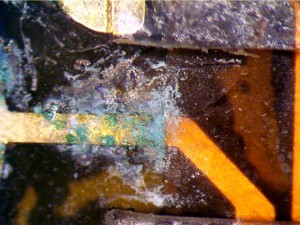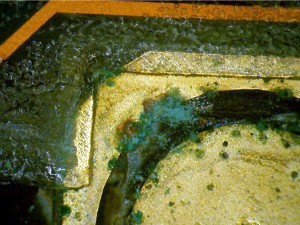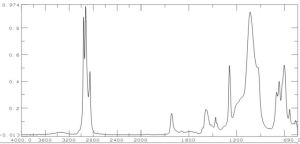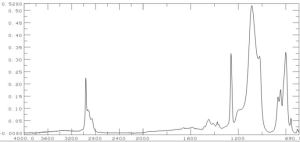Corrosion on Polyimide and Silicone PSA
Gideon Analytical Laboratories received a flex circuit with a mystery corrosion on the polyimide and silicone pressure sensitive adhesive (PSA). There was corrosion by-product, and the silicone adhesive appeared more like a gelatinous material than a tactic PSA. Contrary to popular belief, flex circuits are not training for a future bodybuilding competition, they are a technology for assembling electronic circuits by mounting electronic devices on flexible plastic substrates, such as polyimide, PEEK or transparent conductive polyester film. Additionally, flex circuits can be screen printed silver circuits on polyester. Flexible electronic assemblies may be manufactured using identical components used for rigid printed circuit boards, allowing the board to conform to the desired shape, or to flex during its use. A polyimide is a polymer of imide monomers, and have been in mass production since 1955 due to their diverse applications. The goal was to figure out what the mysterious corrosive substance on the polyimide and silicone PSA on the flex circuit was.
Gideon Analytical Laboratories got right to work in order to solve this mystery. Gideon Analytical Laboratories used a variety of analytical testing to determine what this substance was. First, ion chromatography was carried out. Then, Fourier Transform Infrared Spectroscopy (FTIR), a technique which is used to obtain an infrared spectrum of absorption or emission of a solid, liquid or gas, was carried out. FTIR spectrometer simultaneously collects high spectral resolution data over a wide spectral range.
Using deionized (DI) water and a powerful microscope, several tests were performed working directly with the substance. The area was rinsed and then the residue tested again with FTIR then the polyimide and silicone PSA was squeezed, and the substance that came out was also tested using FTIR. The corroded adhesives contained silicon and zinc and a few locations showed calcium. Most notably, there was aliphatic ester oil and fatty carboxylic acid salts. Likely, the polyimide and silicone pressure sensitive adhesive on this flex circuit was exposed to some kind of oil or mold. Many more details were sent to the customer. The whole issue was the assembly was exposed to incompatible solvents that degraded the internal structure.
Another day, another problem solved. At Gideon Analytical Laboratories, we believe in providing the best failure analysis services we possibly can. We know failing products are a massive headache that can cost your company time and money. So we provide accurate, thorough, and timely results to help you identify exactly why your products are failing so that you can make an informed decision. Let us help you navigate the business world in the future with a little more certainty. If you are having electronics failures, give Gideon Analytical Laboratories a call today.

Corrosion on the PSA

Corrosion by-product

XRF adhesive, interior

XRF white translucent adhesive